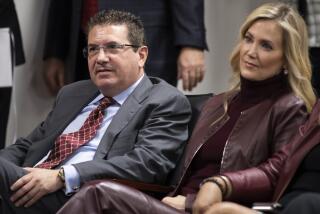Senators File for Bankruptcy
- Share via
The Ottawa Senators were granted protection from creditors Thursday in an Ottawa court, the first step in reorganizing muddled finances that left them unable to meet a player payroll of about $2.2 million Jan. 1.
Under the Companies’ Creditors Arrangement Act, which is similar to Chapter 11 bankruptcy regulations in the U.S., the Senators were promised $8.8 million in short-term financing to pay players and continue operating until Feb. 10. Until then, Pricewater- houseCoopers will serve as a monitor and seek a buyer for the club, with proceeds to go to the Senators’ creditors.
The Senators listed debts of $166.2 million, including $50.7 million to Covanta Energy Corp., $40 million to the Canadian Imperial Bank of Commerce, $20 million to FleetBoston Financial Corp., and $14.2 million to the NHL.
Rod Bryden, the Senators’ majority owner, strongly hinted the club’s days in Ottawa are limited when he compared its predicament to that of the Quebec Nordiques, who were sold and moved to Denver in 1995.
“That the franchise will have a hugely successful future is absolutely clear -- just as the Quebec Nordiques did,” Bryden said during a news conference at the Corel Centre. “But the support of this community will determine where that future is.”
The Nordiques won the Stanley Cup in their first season in Colorado. The Senators have built the best record in the Eastern Conference on a $30-million budget that is the sixth-smallest in the NHL.
Provisions of the filing allow Bryden to bid for the Senators until Tuesday. If he doesn’t bid or if creditors reject his bid by Jan. 24, the club will be sold for far less than he and other investors put into it.
“It is my hope that I will be part of a solution to the current issues that will preserve that value for Ottawa,” he said. But he later added, “There is certainly a chance Ottawa will lose the team.”
His call for community support seems like an empty threat. The local economy is highly dependent on the high-tech industry, which has slumped the last few years. Many corporations can no longer afford suites and many individual ticket buyers find prices beyond their budgets. The Senators have filled 88% of the seats this season, a respectable figure under those circumstances.
NHL Commissioner Gary Bettman called the Senators’ action “a necessary and constructive step” to achieve short-term stability. “Now, we can focus on the club’s long-term needs,” he said in a statement.
Bob Goodenow, executive director of the NHL Players’ Assn., blamed previous financial missteps for bringing the Senators to this point.
“It is indeed unfortunate that both the club and the arena have been undercapitalized since their inception,” he said in a statement. “Over the past few years, the club has been successful on the ice and the Ottawa fans and business community have done their best to support the team. However, the excessive debt load when combined with the weak Canadian dollar have dictated this outcome.”
Although the Senators would have a bargain-basement price tag, they might find few buyers because of uncertainty surrounding labor talks between NHL players and owners. Bettman has been vocal in calling for cost controls, and players have been adamant about rejecting a salary cap. The current agreement, which has no cap or luxury tax, expires Sept. 15, 2004.
More to Read
Go beyond the scoreboard
Get the latest on L.A.'s teams in the daily Sports Report newsletter.
You may occasionally receive promotional content from the Los Angeles Times.







